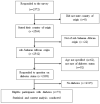Analysis of Perception, Reasons, and Motivations for COVID-19 Vaccination in People with Diabetes across Sub-Saharan Africa: A Mixed-Method Approach
- PMID: 35805551
- PMCID: PMC9266073
- DOI: 10.3390/ijerph19137875
Analysis of Perception, Reasons, and Motivations for COVID-19 Vaccination in People with Diabetes across Sub-Saharan Africa: A Mixed-Method Approach
Abstract
Diabetes mellitus (DM) is associated with severe COVID-19 infection and complications. This study assesses COVID-19 vaccine acceptance and hesitancy in people with DM, and explores the reasons for not being vaccinated. This was a web-based cross-sectional survey using a mixed-method approach conducted in March-May 2021, corresponding to most Sub-Saharan African (SSA) countries' early vaccine rollout period. Participants were those aged ≥18 years with self-reported DM in 11 Sub-Saharan African (SSA) countries. Responses to comments on the reasons for vaccine hesitancy and facilitators for vaccine uptake were analyzed. Of the 73 participants with DM, 65.8% were males, older than 35 years (86.3%), had postsecondary education (90%), and a significant proportion were from South Africa (39.7%), Nigeria (28.8%) and Ghana (13.7%). At the time of this study, 64.4% experienced COVID-19 symptoms, 46.6% were tested for COVID-19, of which 19.2% tested positive. Few participants (6.8%) had received a COVID-19 vaccination, 65.8% were willing to take the vaccine when it becomes available in their country, while 26.0% either refused or remained hesitant towards taking the vaccine. The main identified reasons for not taking the vaccine were: advice from religious leaders; concerns about the safety, effects, and efficacy of the vaccines; mistrust of the pharmaceutical companies producing the vaccines and the process of production; the conspiracy theories around the vaccines; and the personal belief of the participants regarding vaccination. However, participants stated they would take the vaccine if they were more educated about it, received positive feedback from those vaccinated, were rewarded for taking the vaccine, or if vaccination became a condition for travel and employment. In conclusion, this study shows that the uptake of the COVID-19 vaccine was very low in this high-risk group. Efforts to increase the uptake of COVID-19 vaccines among people with diabetes are imperative, such as the provision of education and relevant information.
Keywords: Sub-Saharan Africa; coronavirus; diabetes; hesitancy; lockdown; qualitative; refusal; survey; vaccine.
Conflict of interest statement
The authors declare no conflict of interest.
Figures





References
-
- Saeedi P., Petersohn I., Salpea P., Malanda B., Karuranga S., Unwin N., Colagiuri S., Guariguata L., Motala A.A., Ogurtsova K. Global and regional diabetes prevalence estimates for 2019 and projections for 2030 and 2045: Results from the International Diabetes Federation Diabetes Atlas. Diabetes Res. Clin. Pract. 2019;157:107843. doi: 10.1016/j.diabres.2019.107843. - DOI - PubMed
-
- Atlas D. IDF Diabetes Atlas. 7th ed. International Diabetes Federation; Brussels, Belgium: 2015. International diabetes federation.
-
- Atlas I.D. Global estimates for the prevalence of diabetes for 2015 and 2040. Diabetes Res. Clin. Pract. 2017;128:40–50. - PubMed
MeSH terms
Substances
LinkOut - more resources
Full Text Sources
Medical
Research Materials

